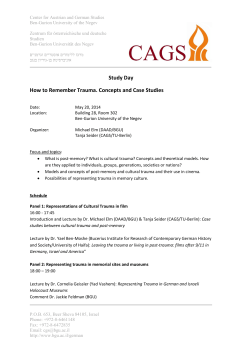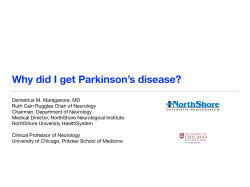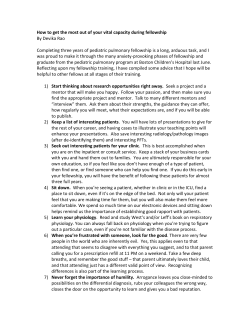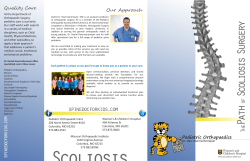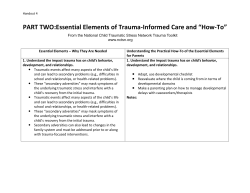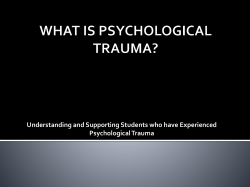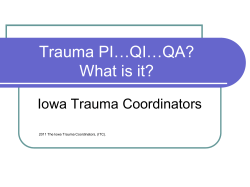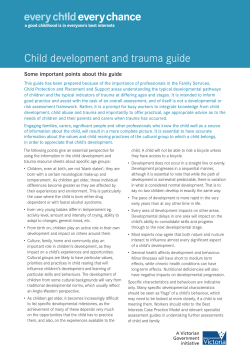
Harvard Orthopedic Trauma Fellowship Introductory Manual Volume 6: September 2014
Harvard Orthopedic Trauma Fellowship Introductory Manual For Interested Orthopaedic Surgeons Volume 6: September 2014 Harvard Orthopedic Trauma Fellowship Program Introduction and Welcome Thank you for your interest in the Harvard Orthopedic Trauma Fellowship Program! This booklet is intended to give you an overview of the fellowship year. We expect that the time you spend with us will be a tremendously productive, thoughtprovoking, and fun experience. While a member of the Trauma team you will have the opportunity to experience a blend of trauma that is both hot and not so hot, complex and more routine. You will frequently be asked to demonstrate independent clinical judgment and will be expected to function with a degree of autonomy. Unlike most Orthopaedic subspecialties, trauma is a team effort. To deliver quality patient care it is essential that we work together with everyone thinking, spotting problems and developing solutions. Working as a team lessens the burden for all of us, but it also means that we are as strong as our weakest link. We hope you will do your part to make our service the best in the country and that your experience is one you will share with future generations of Orthopaedists. We have put together the following information with the expectations it will assist you in learning about the fellowship experience, our philosophies, and our team. That said, this manual is in no way exhaustive or meant to discourage you from asking any questions about our program. Please do let any of us know of any questions you may have. Fellowship Structure The program offers two one-year fellowships. The Fellow must successfully apply for a full Massachusetts license, and is then credentialed as an attending surgeon.* The fellowship is divided into two 6-month blocks. One fellow is employed by BWH; one fellow is employed by MGH. Each fellow spends six months at the hospital at which they are employed and then six months at the sister hospital. The fellow functions as a full attending physician, with a corresponding high degree of independence in the operating room, and in both the in and outpatient settings. He/She is expected to be proficient in the care of basic fractures and help take the residents through these fractures in the operating room. As the year goes along, the fellow is allotted increasing responsibility under staff supervision for progressively complex trauma cases. The fellows have trauma specialist backup at all times and all of their clinical activity is monitored daily by trauma specialists. Combined institutional specific educational conferences take place throughout the year. Both institutions are certified by the American College of Surgery as Level I Trauma Centers, and have designated orthopaedic trauma operating rooms available for acute and emergent cases. A common database (Ortho DUDE) exists for all cases performed by the orthopaedic trauma service at the two institutions. While you will practice at a single hospital for six months at a time, you are encouraged to travel to the sister hospital whenever there are good cases at that hospital – i.e. pelvic and acetabular fractures; nonunions. You are also encouraged to attend trauma-related meetings and seminars at the sister hospital whenever you are available. We encourage our fellows to stay in close contact with one another so that you stay aware of these cases and meetings. * For information about Massachusetts licenses, please visit: http://www.mass.gov/massmedboard. Faculty Volume 6: August 2014 1 Harvard Orthopedic Trauma Fellowship Program During the fellowship year, you will work closely with faculty on both the Trauma, Hand & Upper Extremity, and Foot & Ankle Services at the MGH and BWH. Below are the faculty and their affiliations. Trauma Service Mark Vrahas, M.D. – Fellowship Director Partners Chief of Orthpaedic Trauma Director, Trauma Fellowship Program Massachusetts General Hospital Brigham and Women’s Hospital Associate Professor of Orthopaedic Surgery R. Malcolm Smith, M.D. Massachusetts General Hospital Chief of Orthopaedic Trauma Associate Professor of Orthopaedic Surgery Partners Orthopaedic Trauma Mitch Harris, M.D. Brigham and Women’s Hospital Chief of Orthopedic Trauma Professor of Orthopaedic Surgery Partners Orthopaedic Trauma David Lhowe, M.D. Massachusetts General Hospital Assistant Professor of Orthopaedic Surgery Partners Orthopaedic Trauma Michael Weaver, M.D. Brigham and Women’s Hospital Instructor of Orthopaedic Surgery Partners Orthopaedic Trauma Marilyn Heng, M.D. Massachusetts General Hospital Instructor of Orthopaedic Surgery Partners Orthopaedic Trauma Hand & Upper Extremity Service Jesse Jupiter, M.D. Massachusetts General Hospital Hansjörg Wyss AO Professor of Orthopaedic Surgery David Ring, M.D., Ph.D. Chief, Orthopaedic Hand Service Massachusetts General Hospital Associate Professor of Orthopaedic Surgery Volume 6: August 2014 2 Harvard Orthopedic Trauma Fellowship Program Brandon Earp, M.D. Chief of Orthopedic Surgery Brigham and Women’s Faulkner Hospital Brigham and Women’s Hospital Assistant in Orthopaedic Surgery Hand and Upper Extremity Service George Dyer, M.D. Director, Harvard Combined Orthopaedic Residency Program Brigham and Women’s Hospital Assistant Professor of Orthopaedic Surgery Hand and Upper Extremity Service Geriatric Medicine Both inpatient teams at BWH and MGH include physicians from the Geriatric Medicine Service who help us better coordinate the treatment and care of our patients 65 and older with complex medical issues. Our geriatricians are: Drs. Houman Javedan (BWH), Franco Esteban-Garcia (MGH). In addition to the above faculty, we strongly encourage you to take advantage of the many areas of clinical expertise available both at MGH and BWH. You are encouraged to discuss cases with other services and when appropriate assist in cases with other attendings and fellows. Educational Program – Basic Curriculum General Requirements: In accordance with the general competencies endorsed by the ACGME, our Fellowship Program emphasizes the following core competencies: professionalism, patient care, medical knowledge, practice-based learning, interpersonal and communication skills and system-based practices. Professionalism: The Fellow is expected to demonstrate respect, compassion, and integrity. He/She is expected to be responsive to the needs of his/her patients and demonstrate commitment to excellence and on-going professional development. Additionally, the Fellow will be expected to demonstrate a commitment to ethical principles pertaining to provision or withholding of clinical care, confidentiality of patient information, informed consent, and business practices. The Fellow will also be expected to demonstrate sensitivity and responsiveness to each patient’s culture, age, gender, and disability. Clinical Competence: The Fellowship Program has been designed to permit fellows to develop advanced technical competence in the field of orthopaedic trauma. The fellows must be able to provide patient care that is compassionate, appropriate, and effective for the treatment of health problems and the promotion of health. This will require effective communication and respectful behaviors when interacting with patients and their families. The Fellow will be responsible for making informed decisions about diagnostic and therapeutic interventions based on patient information and preferences, up-to-date scientific evidence, and clinical judgment. He/she will need to be able to develop and carry out patient management plans and to counsel and educate patients and their families. Volume 6: August 2014 3 Harvard Orthopedic Trauma Fellowship Program Within each practice site the Fellow will be asked to practice cost-effective health care and resource allocation that does not compromise quality of care. He/she will need to advocate for quality patient care and assist patients in dealing with system complexities. Additionally, the faculty will emphasize the importance of knowing how to partner with health care managers and health care providers to assess, coordinate, and improve health care. At each hospital the fellow will function as a junior attending with graduated responsibility as the year progresses and his or her abilities advance. Throughout the year, faculty will be available for consultation and assistance as necessary. Periodic performance reviews will occur with the program director or the site director. These will be based on evaluation by the individual faculty and, separately, by the PGY5 residents. The surgical experience : At each hospital the fellow is scheduled to be in the operating room 3-4 days per week along with an attending. Each morning the trauma services at each hospital meet to review surgeries and admissions from the previous day and to review that day’s operative cases. At this morning report the staff critically reviews the previous day’s cases and discusses operative strategies and logistics for the day’s cases. The staff then assigns cases to the fellow and residents based on the complexity of the cases. For complex cases the fellow operates with the attending either as the surgeon or first assistant depending on the case complexity and the fellow’s ability. For less complex cases the fellow may be assigned to work with the resident either as the surgeon or as first assistant to the resident. The faculty review and evaluate all of the fellow’s cases both pre- and post-operatively to provide constructive feedback. Knowledge and skill sets that are specifically focused upon include but are not limited to: a. An understanding and appreciation of the integral role of the orthopaedist in the management of the multiply injured patient. 1. Timing of orthopaedic procedures 2. Magnitude of procedures: Damage control vs. definitive treatment 3. Indications for early or immediate limb amputation, fasciotomy for compartment syndromes, and the appropriate clinical setting for limb salvage and reconstruction 4. Indications and techniques of for various types of internal and external fixation devices 5. The diagnosis and management of complications related to orthopaedic trauma a. Soft tissue b. Hardware related c. Boney complications: nonunions, malunions, osteomyelitis d. Psychological effects of trauma on the patient and family e. Familiarity with recuperative and rehabilitation techniques and the utilization of physical and occupational therapy enabling the injured patient to return to function. The fellowship provides a busy operative experience with each fellow involved in over 350 cases either as surgeon or first assistant. By the end of the program the fellow is expected to be proficient in the management of complex pelvic and acetabular trauma, complex intra-articular fractures, the multiply-injured patient, and to be expert in the management of basic fractures. Volume 6: August 2014 4 Harvard Orthopedic Trauma Fellowship Program More specifically: • Pelvic and acetabular fractures represent the most complex of orthopaedic trauma cases. Between the two hospitals we see approximately 150 of these cases per year. An effort is made to ensure that one or both fellows are involved in all these cases. • Both campuses have trauma surgeons who have completed fellowship training that includes the management of spinal fractures. The Fellows will be afforded the opportunity to participate in these cases, but it will not be required. We are acutely aware of the need to train our residents. The fellows are expected to be proficient in basic fracture surgery. Thus, basic fracture cases are reserved for the residents under the supervision of the faculty or the fellow. There will be active, on-going monitoring by the faculty to ensure that the fellowship educational and surgical experience does not interfere with the educational or surgical experience of the residents. These arrangements are designed to accomplish three essential goals: 1. Teach the fellow how to do complex orthopaedic trauma cases. 2. Provide the fellow with an independent operative experience with back up as necessary and next day constructive feedback. 3. Allow the fellow the experience of teaching the residents. The outpatient clinics – At the MGH the fellow conducts 1.25 outpatient clinics per week to see an average of 35 patients total for the week. The full day clinic is conducted in conjunction with a faculty clinic and the half-day clinic is conducted separately. At the BWH the fellow conducts one half-day clinic per week to see an average of 15-20 patients and assists in faculty clinics when available. The outpatient clinics allow the fellow the chance to follow patients he or she has operated on and to see new patients and devise management plans. With these clinics the fellow has his “own patients” and is expected to deal with all patient phone calls and related paper work. The fellow has an administrative assistant at both sites. Inpatient responsibilities: The PGY5 residents are expected to run the inpatient services. The fellow’s role is as an attending on the service. Call responsibilities: The fellow is included in the regular call schedule as an attending and takes the same amount of call as other trauma attendings. The fellow is assigned one call day per week and one weekend per month. If the fellow volunteers to cover additional uncovered days he or she receives additional pay for that day. On average the fellows cover one additional day per month. When on call, the fellow is expected to operate only on true emergency cases. Faculty backup is always available. The fellow is expected to call the Faculty for advice and assistance before taking a complex case to the OR Educational Conferences and Meetings: In House: Our fellowship curriculum contains two main didactic components: a bimonthly faculty-run fellow-specific educational conference; and quarterly cadaver skills sessions at a nearby surgical education center. The fellows are quite involved with the skills sessions, selecting the topics of interest and the guest sages for each. Out of House: We believe strongly that training outside of the hospital is an important part of the fellowship experience. With this in mind, we pay for our fellows to attend up to four (4) Volume 6: August 2014 5 Harvard Orthopedic Trauma Fellowship Program educational conferences and meetings per year – including the OTA and the AONA Pelvic and Acetabular Fracture Management Course. Salary and Benefits : The Orthopaedic Trauma Fellow salary is commensurate with that of a PGY6 resident. The salary for the 2014-15 academic year is $73,150.00. Salaries are adjusted by 2-3% each year. Benefits include many competitive health, dental, and vision coverage options. Research General The Trauma Service has an active basic science and clinical research program. Fellows are expected to complete a research project during the academic year. By the end of the fellowship, you are expected to have a manuscript prepared for presentation at our annual Harvard Orthopaedic Trauma Research Day with the ultimate goal of publication. We have a full-time research coordinator and a statistician to help you with your projects. Harvard Orthopaedic Trauma The trauma services of the four Harvard hospitals – MGH, BWH, Beth Israel Deaconess, and Children’s Hospital – collaborate whenever possible on clinical research. Toward this end, we convene a Harvard-wide research monthly meeting where there are discussions about ongoing and future research ideas, projects, and collaborations. Attendees include clinical faculty, fellows, residents, research staff, and personnel from the labs. Anyone interested in working on or learning about how to do research is encouraged to attend. Fellows are expected to attend. Ortho DUDE – Data Utility for Documentation and Education Since April 2002, the Partners Orthopaedic Trauma Service has been using a database application called Ortho DUDE to track all fractures, dislocations, and major soft tissue injuries and their operative treatments. To date, there are approximately 100,000 patients in DUDE. As a fellow, you will be able to mine the associated data for projects and papers. The application – which is primarily a registry - also contains scheduling and billing functions, and a patient education component. As a Fellow, you will use DUDE to code (bill) your surgical billing and your ED and Inpatient consults. Hospital and Service Information For more information about our hospitals and service General, please visit our websites: http://www.brighamandwomens.org/orthopedics/ http://www.massgeneral.org/ortho/ http://achesandjoints.org/trauma/ Volume 6: August 2014 6 Harvard Orthopedic Trauma Fellowship Program Orthopaedic Trauma Fellow Alumni We maintain great relationships with all of our alumni. Please feel free to contact any of them. Stéphane Bergeron, M.D. Jewish General Hospital McGill University Montreal, Quebec sbergeron8@hotmail.com Srino Bharam, MD Roosevelt/St. Luke’s Hospital New York City, NY (212) 691-3535 www.srinobharammd.com Tim Bhattacharyya, M.D. Ortho Bethesda Bethesda, MD tbhattacharyya@bcc-ortho.com Henry Boateng, M.D. Penn State Hershey Bone and Joint Institute Phone: (202) 271-5264 Hboaten1@gmail.com Joaquin Castaneda, M.D. Orthopaedic Trauma and Reconstructive Surgery Columbus, Ohio castahu@yahoo.com Lauren Crocco, MD Staff Surgeon Montefiore Hospital New York City, NY laurencrocco@gmail.com 914-419-0598 Erica Dafford, M.D. South Shore Hospital Weymouth, MA Phone: 608-695-3646 E-mail: ebg113@hotmail.com Roy I. Davidovitch, M.D. Chief, Orthopaedic Trauma Service, Jamaica Hospital Medical Center NYU Hospital for Joint Diseases Phone: 212-598-6115 Roy.Davidovitch@nyumc.org Volume 6: August 2014 7 Harvard Orthopedic Trauma Fellowship Program Colin Heinle, MD Lancaster General Health Lancaster, PA Colin.heinle@gmail.com 207-841-3694 David Joseph, M.D. Elmhurst Hospital Elmhurst, NY Davidjosephmd@gmail.com Brian Ladner, M.D. North Oaks Orthopedic Clinic; Ponchatoula, LA Phone: 228-860-9685 Blad333@aol.com Eric Marsh, M.D. Rutland Regional Medical Center Rutland, VT ejmarsh73@yahoo.com Trevor Owen, M.D. Orthopaedic Trauma Service Carilion Clinic Roanoke, VA docowen@gmail.com Nimesh Patel, M.D. Panorama Orthopaedics Golden, CO nimeshpatel100@gmail.com Trinity Pilkington, M.D. 104 Sheldon Ct Yorktown, VA 23693 Phone: 412-716-9211 trinitypilkington@yahoo.com Kevin Riché, M.D. Orthopaedic Traumatologist Baton Rouge, LA Office: 225-924-2424 Cell: 225-993-2374 kevinbriche@gmail.com Charisse Y. Sparks, M.D. Director of Orthopaedic Trauma Volume 6: August 2014 8 Harvard Orthopedic Trauma Fellowship Program Longview, Texas cysparks@gmail.com Eugene Toney, M.D. Kaiser Permanente Honolulu, HI Cell: 317-289-7351 eatoney@hotmail.com Michael J. Weaver, M.D. Brigham and Women’s Hospital Boston, MA Office: 617-525-8088 Cell: 617-549-2233 mjweaver@partners.org John (Jack) J. Wixted M.D. University of Massachusetts Memorial University Campus; Worcester MA Office: 508-334-2145 Cell: 617-543-4213 wixtedj@ummhc.org For More Information You are welcome and encouraged to contact our Fellowship Director, Mark Vrahas, M.D., (mvrahas@partners.org; 617-726-2943) and our Fellowship Coordinator, Paula François (pfrancois4@partners.org); 617-643-0149) with questions. Volume 6: August 2014 9
© Copyright 2025

